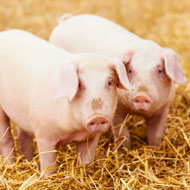Scientists create pigs resistant to PRRS

PRRS can lead to severe breathing problems in piglets and breeding failures in pregnant females.
Scientists have used advanced gene editing techniques to create pigs that show signs of resistance to a major viral disease.
Writing in the journal Plos Pathogens, researchers describe how they produced pigs that are completely resistant to porcine reproductive and respiratory syndrome (PRRS).
The team claims the pigs are otherwise healthy and the change introduced using gene-editing technology should not affect their ability to stave off other infections.
“Genome-editing offers opportunities to boost food security be reducing waste and losses from infectious diseases, as well as improving animal welfare by reducing the burden of disease,” explained lead researcher Professor Alan Archibald of The Roslin Institute.
PRRS can lead to severe breathing problems in piglets and breeding failures in pregnant females. Endemic in most pig-producing companies, vaccines have, on the whole, failed to prevent the spread of the virus. In Europe alone, the disease is thought to cost the industry some €1.5billion every year.
Research conducted in the past shows that the PRRS virus targets immune cells called macrophages. A molecule on the surface of these cells called CD163 is essential in enabling the PRRS virus to establish an infection.
In the study, scientists used a gene editing tool called CRISPR/Cas9 to cut out a small section of the CD163 gene in the pigs’ DNA that interacts with the PRRS virus. Research shows that this change prevents the virus from causing infection.
Professor Bruce Whitelaw, interim director of the Roslin Institute described the project as an ‘elegant demonstration’ of how precise genome editing can be.
“We have deleted a single exon from the CD163 gene. The opportunity to use this technology to Improve animal health and productivity presents an exciting approach to address the food security and one health challenges,” he said.
The study was funded by the Biotechnology and Biological Sciences Research (BBSRC) Animal Research Club and Genus.



 The latest
The latest